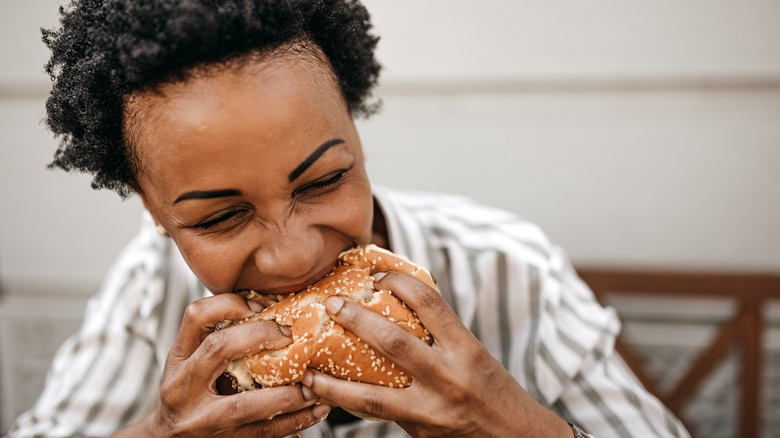The Way You Chew Your Food Has An Unexpected Effect On Your Weight
We may receive a commission on purchases made from links.
As most experts would tell you, the digestion process actually starts as soon as you put a forkful of food in your mouth — the enzymes in your saliva help moisten the food and break it down and your teeth do the all-important job of slicing the food into manageable and small particles that can go down your throat and into your belly more smoothly. Chewing is one of ways to naturally improve your digestion. If you are trying to prevent heartburn or you want to simply enjoy your meal more, the trick is to munch slowly.
The way you chew your food also has an impact on weight loss, according to science. For starters, when you practice mindful eating, you're giving your brain enough time to register its hunger and satiation cues. Apparently, it takes about 20 minutes from the time food enters your mouth for your brain to register fullness (via Web MD). By giving yourself time between each mouthful, you're leaning into these hunger and fullness cues more, thereby avoiding overeating.
A 2017 study published in BMJ Open that tracked people with diabetes found that people who took the time to eat mindfully felt full sooner and also had smaller waist circumferences and reduced body mass index (BMI). A 2013 study published in the Journal of the Academy of Nutrition and Dietetics found that people who didn't rush through meals ate less.
The link between eating slowly and burning calories
There is also some science to support the theory that the way you chew your food could also contribute toward calorie burn. One study that looked into this was a 2014 study published in the journal Obesity. Fewer chews and shorter meal times were linked with reduced diet-induced thermogenesis (DIT), otherwise known as an increase in metabolic rate in your body after you've consumed food. A 2021 study published in Scientific Reports had similar results.
Professor Naoyuki Hayashi from Waseda University, Japan, who co-led the 2021 study shared (via Science Daily), "We found DIT or energy production increased after consuming a meal, and it increased with the duration of each taste stimulation and the duration of chewing." Taking the time to properly chew you food could promote weight loss by preventing metabolic syndrome, added the researchers. Metabolic syndrome refers to a group of health risks related to cardiovascular disease — like obesity and hypertension (via Johns Hopkins Medicine).
Since science has so much to say about mindful eating, how can someone who's prone to eating too fast change their habits? It might look simple on the outset, but changing the way you eat is going to take some trial and error but at least you're more likely to lose weight (if that's a goal for you). Here are some tips.
How to learn to chew slowly
You may want to start off with looking at your eating habits in general — do you eat in front of the TV all the time? Do you rush through your meals because of work deadlines? Does this mean you snack in the car or at your work station while replying to emails?
In order to be able to chew slowly, you may have to first separate meal times from other distractions. For some, this might mean making a conscious choice to sit at the dinner table instead of in front of the TV. For others, it could simply be about paying attention to the number of times you're chewing your food. Once you've established meal times, you can try some expert-recommended tips like 40 chews per bite, taking a sip of water after each mouthful, or pacing yourself with a slow-eater (via Eating Well).
If any of these feel too forced or hinder the pleasure of eating for you, you can try what nutritionist and author of "The Low-Fad Diet: A healthy balanced diet for weight loss, for life," Jo Travers, shared with The Guardian. Take a bite of your food, put the cutlery or food down until you're done chewing and swallowing, and then pick up the food or cutlery again. "There is something that invites urgency when you have a fork full of food in front of your face, waiting to go into your mouth, which makes you think you need to finish your food more quickly," explained the registered dietician.



